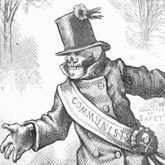|
Cyrano4747 posted:the divine right of kings backed by Papal sanction that you see in post-Charlemagne Europe. At a guess forming some kind of body to try and negotiate with the monarch seems like something that might be an attractive point short of rebellion if your cultural assumption is that the King was appointed irrevocably by God. That's not how it worked tho. Anywhere. Hell, in England (the oldest surviving example) it was literally forced on the monarch by rebellious barons.
|
|
|
|

|
| # ? May 22, 2024 15:17 |
|
the idea that the divine right of kings means autocracy is a post 17th century thing, not pre
|
|
|
|
Cyrano4747 posted:This can also be modified by what kind of right to rule the king is claiming. Begining with the Zhou in China, for example, you have the idea of the "mandate of heaven" where the monarch has a responsibility to govern well and for the benefit of his people. Doing so indicates he has the favor of heaven, and if he's an unjust ruler then he's clearly lost heaven's support and rebellion is justified. I don't know enough to comment deeply on it, but it seems a much more flexible system re: getting rid of monarchs than the divine right of kings backed by Papal sanction that you see in post-Charlemagne Europe. At a guess forming some kind of body to try and negotiate with the monarch seems like something that might be an attractive point short of rebellion if your cultural assumption is that the King was appointed irrevocably by God. The mandate of heaven is only successfully claimed after an insanely bloody four sided civil war, so it doesn't really do much practically speaking.
|
|
|
|
FishFood posted:Carthage had a Senate. And ancient India had city state republics similar enough to the Greeks. A lot of tribal societies probably fit to an extent.
|
|
|
|
VoteTedJameson posted:Can anyone here recommend me a good source to learn about the living conditions of the urban poor in the middle ages? A lot of sources I read seem to refer to large towns and cities as if they were only inhabited by skilled craftsmen, students, and nobility in their city-houses. The Western Roman Empire housed the urban lower class in insulae, but then I'm very unclear on whether some sort of apartment-analog survives after the Empire implodes. Can anyone comment on this, or recommend me a source? I'm mostly interested in France, (meaning Paris, as most of the other urban centers get real sparse) but I'd also be fascinated to hear if the Insulae persisted in the surviving Eastern Roman world. Thanks, medievalists. Sharon Farmer's Surviving Poverty in Medieval Paris should be almost exactly what you're looking for, although if I remember correctly Farmer might not devote as much attention to the types of details you ask about. Her bibliography should be very helpful at least, though.
|
|
|
|
deadking posted:Sharon Farmer's Surviving Poverty in Medieval Paris should be almost exactly what you're looking for, although if I remember correctly Farmer might not devote as much attention to the types of details you ask about. Her bibliography should be very helpful at least, though. Sounds like a really interesting study. I still have borrowing priveleges at my alma mater, I'll see if they can get me a copy. Thanks for the recommendation!
|
|
|
|
FishFood posted:Carthage had a Senate. About which we know nothing. In particular we have no reason to think it was elected; nor, indeed, was the Roman Senate. (Or the US one for that matter, to start with!)
|
|
|
|
So, a while back I read about how most kinds of higher learning in the heyday of the Roman empire were conducted in Greek, how the bulk of the influential works were never translated into Latin and therefore largely forgotten in Western Europe (with a possible exception for translations from Arabic) until the renewal of interest in Greek learning in the Renaissance era. This seems strange given that Charlemagne was considered to have restored the Western Empire and promoted the attempt to revive Roman learning known as the Carolingian Renaissance. The question is: why didn't Charlemagne or any of his successors attempt to revive the study of Greek philosophy and science given that they were in contact with the Eastern Empire/Byzantines and presumably could have recruited some of their scholars and have them set up schools in the West? Or was this actually attempted, but failed for some reason or other?
|
|
|
|
They weren't necessarily on good terms with the Byzantine empire, and I really wouldn't expect an illiterate frank like Charlemagne to see inherent superiority in Greek scholarship. Rome itself was valuable because it had the Pope to proclaim him Emperor of all Romans, but the Byzantines not so much. He did reach out to the Muslim Empire though, but all he got out of that were some cool-rear end elephants.
|
|
|
|
Found this on wikipedia:quote:This movement to reintegrate the regular study of Greek literary, historical, oratorical and theological texts back into the Western European curriculum is usually dated to the 1396 invitation from Coluccio Salutati to the Byzantine diplomat and scholar Manuel Chrysoloras Seems it took roughly 600 years from the time of Charlemagne before there were any serious attempts to study Greek literature in the West. Like I mentioned, the Byzantines kept up the tradition until the end, but why so little interest in the West until they were almost gone?
|
|
|
|
Kopijeger posted:So, a while back I read about how most kinds of higher learning in the heyday of the Roman empire were conducted in Greek, how the bulk of the influential works were never translated into Latin and therefore largely forgotten in Western Europe (with a possible exception for translations from Arabic) until the renewal of interest in Greek learning in the Renaissance era. This seems strange given that Charlemagne was considered to have restored the Western Empire and promoted the attempt to revive Roman learning known as the Carolingian Renaissance. There are a lot of assumptions here that I think need to be unpacked. First, the "Carolingian Renaissance" (which isn't a term favored by Carolingianists in large part because of what "renaissance" often implies) is not really about a revival of learning or knowledge as we think of those terms. In extremely broad terms, the efforts of the scholars involved in the "Carolingian Renaissance" are primarily religious; an effort to assure uniform Christian belief and practice through cultivating correct Christian texts and thought. It's extremely telling in this context that the highest form of intellectual activity in the Carolingian period is biblical exegesis. The texts that are valued (and available) in these undertaking are things like scripture, commentaries on scripture, and patristic authors like Augustine. Second, knowledge of Greek in the Carolingian west is not very widespread and on top of that a lot of the standard texts of Greek philosophy are not available in the west by the late eighth century. That said, some Carolingian scholars do have a relatively good understanding of Plato, but they know their Plato from the work of Late-Antique Latin commentators like Calcidius, Boethius, and Martianus Capella. John Scotus Eriugena, for example, draws heavily on neoplatonic thought in his theological writings (and IIRC is one of the few Carolingian intellectuals who knew Greek). Whatever of Plato they do know, however, is largely folded into the goals I outline above.
|
|
|
|
deadking posted:The texts that are valued (and available) in these undertaking are things like scripture, commentaries on scripture, and patristic authors like Augustine. And no theological works that were at the time only available in Greek would be considered valuable for this purpose? quote:Second, knowledge of Greek in the Carolingian west is not very widespread and on top of that a lot of the standard texts of Greek philosophy are not available in the west by the late eighth century. I already knew that Greek was poorly known in that era. My question was more or less this: why was there seemingly little interest in learning it until 1400 or so? Kopijeger fucked around with this message at 08:29 on Mar 25, 2017 |
|
|
|
You're hot as hell right now
|
|
|
|
Kopijeger posted:And no theological works that were at the time only available in Greek would be considered valuable for this purpose? There might well have been Greek theological works that Carolingian theologians may have been interested in, but again the texts aren't circulating in the west at this point and very few people could have read them anyway. The Carolingians aren't totally ignorant of contemporary theological disputes and developments in the Byzantine empire, though. There's a council held at Frankfurt in 794 that responds to the Iconoclast controversy. That council basically affirms the reinstatement of images at the 787 Council of Nicaea (not that the Frankish church had ever observed the decisions of earlier Byzantine iconoclast councils). Although, perhaps because they're working from a bad translation of the Greek records of that council, they think Nicaea calls for the worship of images themselves (it doesn't) and argue strenuously against that. So, basically, they're at least somewhat aware of what the eastern church is doing, and often think it's wrong or misguided. I'm not quite sure how to answer your second question, but I'll take a stab at it. You mentioned Greek philosophy in your original question and again they're just much less interested in Plato and Aristotle for their own sake (as opposed to the later Italian Renaissance, where the whole point is the perceived revitalization of classical learning) and more interested in improving perceived inconsistencies and abuses in the texts and practices they're used to. One of the primary motivators for the efforts to expand and improve the quality of Latin education (which really shouldn't be overstated; the goal is never anything like mass literacy) is to make sure that priests knew how to read and perform various essential Christian rituals (baptism, the liturgy, etc.) correctly. In the west these are all done in Latin, so obviously the focus is on Latin education. Greek just simply doesn't factor into that, perhaps for practical reasons. There's no reason a early medieval western priest needs to know Greek to perform his liturgical duties, and in reality it's hard enough to make sure that rural priests are Latin literate. Given the dearth of Greek texts circulating in the west and the absence of people who know and could teach Greek it was probably unfeasible on top of that. Again, there are guys like Eriugena who do know Greek, and other Carolingian theologians seem to have had a passing familiarity with the language (enough to comment on the significance of Greek terms in authors like Martianus Capella), so I'm not saying that there's a total lack of interest, just that in their eyes Greek was of limited interest and value. So, basically, I think there's a disconnect between what we expect when we think of terms like "renaissance" and "education reform" and what the Carolingians were hoping to achieve with their "reforms." Your question about why Charlemagne or whoever didn't recruit Greek scholars is interesting and I'm not sure how to answer it. After all, a lot of the most prominent intellectuals in the early stages of the Carolingian "renaissance" are from Britain (e.g. Alcuin) or Italy (Paul the Deacon). So it's not out of the realm of possibility, but again there doesn't seem to have been much motivation to do so. Perhaps because as Slothfulcobra suggests they don't see Greek learning as inherently valuable or prestigious as later Renaissance scholars do. Not because Charlemagne is an illiterate barbarian (he was happy enough to patronize Latin scholarship) but because it doesn't align with their educational objectives. Rodrigo Diaz posted:You're hot as hell right now I'm all steamed up over Charlemagne and his family of hosed up weirdos!
|
|
|
|
If this was the forums ten years ago you'd probably earn yourself a nifty animated "I'm MAD about Carolingians" custom title.
|
|
|
|
Does anyone have books/blogs/podcasts about the Hundred Years War that they would recommend? I'm hoping for something digestible so I can share it with the other people on my project that aren't history buffs.
|
|
|
|
|
Triskelli posted:Does anyone have books/blogs/podcasts about the Hundred Years War that they would recommend? I'm hoping for something digestible so I can share it with the other people on my project that aren't history buffs. Hey Gail's post history?
|
|
|
|
Honestly if you just need to disseminate info print out the wikipedia page. There are good reasons your profs don't want you citing it on a paper, but for building a common base of rudimentary knowledge it's a really solid resource.
|
|
|
|
Splode posted:Hey Gail's post history? A hundred years, thirty years, what's the difference?
|
|
|
|
Kopijeger posted:A hundred years, thirty years, what's the difference? 80 years of war.
|
|
|
|
Molentik posted:80 years of war. 100 - 30 is not 80.
|
|
|
|
Cyrano4747 posted:100 - 30 is not 80. 86 years, to be precise.
|
|
|
|
Historians: bad at math since forever.
|
|
|
|
Vincent Van Goatse posted:Historians: bad at math since forever. My doctoral advisor once commented in a class that he'd seen my GRE Math scores and it was a good thing I'd opted for the humanities.
|
|
|
|
Cyrano4747 posted:100 - 30 is not 80. To be fair, the Hundred Years War wasn't 100 years Vincent Van Goatse posted:Historians: bad at math since forever. I actually have a degree in math and can tell you that being bad at arithmetic is cross-disciplinary. Working with actual numbers instead of variables is just not right
|
|
|
|
Triskelli posted:Does anyone have books/blogs/podcasts about the Hundred Years War that they would recommend? I'm hoping for something digestible so I can share it with the other people on my project that aren't history buffs. The Hundred Years War by Desmond Seward is good and short. Here's the Amazon link: https://www.amazon.com/Hundred-Years-War-English-1337-1453/dp/0140283617.
|
|
|
|
Vincent Van Goatse posted:Historians: bad at math since forever. Counterpoint: scientists (my wife, who just passed her viva): bad at spelling and grammar since forever Edit: split the difference, read up on the Eighty Years' War! feedmegin fucked around with this message at 18:56 on Mar 28, 2017 |
|
|
|
deadking posted:It's extremely telling in this context that the highest form of intellectual activity in the Carolingian period is biblical exegesis. The texts that are valued (and available) in these undertaking are things like scripture, commentaries on scripture, and patristic authors like Augustine. Out of curiosity, how well known/how big a deal was it that Scripture itself, i.e. the New Testament, was written in Greek originally not Latin? (Plus also said patristic authors). You'd think that alone would be reason for some interest in the language.
|
|
|
|
feedmegin posted:Out of curiosity, how well known/how big a deal was it that Scripture itself, i.e. the New Testament, was written in Greek originally not Latin? (Plus also said patristic authors). You'd think that alone would be reason for some interest in the language. I'm weak on my church history, so I'm probably half wrong on this, but my understanding is that the politics of Rome trying to distance itself from Constantinople in the 700s also plays into it.
|
|
|
|
feedmegin posted:Out of curiosity, how well known/how big a deal was it that Scripture itself, i.e. the New Testament, was written in Greek originally not Latin? (Plus also said patristic authors). You'd think that alone would be reason for some interest in the language. They do recognize a special status for Greek as one of the three "sacred" languages (along with Latin and Hebrew), a categorization that comes from, among other sources, Isidore of Seville, with whom the Carolingians were quite familiar (Hrabanus Maurus writes an encyclopedia called De universo which consists in large parts of block quotes from Isidore). I think I've overstated the absence of interest in Greek in my previous post. It's just that Greek has very little "practical" use for a lot of what Carolingian educational efforts (which were far from coherent in many cases) were trying to accomplish (i.e. a basic level of literacy for priests). There is a certain level of interest in Greek among Carolingian intellectuals, but this goes on at a very high register and at places with particularly good libraries. Even at these places there are obstacles to learning Greek (no teachers, unreliable access to texts, etc.). I did a bit of digging in response to these questions and here's a choice quote from Bernice Kaczynski's book on the Greek manuscripts at St. Gall: "Few of them [the monks] succeeded in mastering the language. They might learn the letters of the alphabet, memorize words from vocabulary lists, and follow Greek prose with the help of Latin translations. But they suffered because they did not have an elementary foundation in elementary grammar. The Carolingian world had few resources for the study of Greek, and though the St. Gall monks had access to most of what seems to have been available at the time, they were unable to overcome this limitation." So, basically, there was interest in Greek in some institutions in the Carolingian empire, but there are strong limitations to what Carolingian scholars could do with Greek and apparently little impetus in overcoming those limitations, I suspect for some of the reasons I've suggested above. I would also like to say that the original question wasn't - to paraphrase - "did the Carolingians know any Greek?" but "why didn't the Carolingians care about Greek science and philosophy?" There I think the main part of my answer (and I am sorry if I was being a dick) stands. The value that we and later medieval movements like the Italian renaissance place on the big names in ancient Greek thought are the product of a very different set of priorities and valuing of learning than the Carolingians had. Aristotle, for example, is not IIRC totally unknown in the Carolingian period (although he's known primarily indirectly through other, Latin sources and only in part), but the priorities and cultural values of Carolingian scholars simply don't emphasize that aspect of the Greek intellectual tradition. Would Carolingians have been more interested in Aristotle if they knew more of him? I suspect in part yes, but again they just don't have the same relationship to Greek that the Italian renaissance or a modern classics or philosophy department do. Not to suggest that those two have the same set of standards. Cyrano4747 posted:I'm weak on my church history, so I'm probably half wrong on this, but my understanding is that the politics of Rome trying to distance itself from Constantinople in the 700s also plays into it. I'm not a church historian either, but that probably did contribute, although it's worth noting that in the 8th and 9th centuries the pope does not have the same prominence in western Christianity that he does in later periods. In the Carolingian period the pope is recognized as somewhat special and deferred to often, but many doctrinal issues are discussed and resolved at councils of Frankish bishops who apparently felt no need to get the pope's opinion or permission before proceeding. There are also examples of tensions between individual Frankish bishops and popes. As various groups in central and eastern Europe convert to Christianity in the early Middle Ages the language of the liturgy they decide to adopt is highly politicized, though. For example, when the Bulgars convert in the 9th century, Khan Boris seems to have "played" the pope against the patriarch in Constantinople to see who he could get a better offer from.
|
|
|
|
Kopijeger posted:A hundred years, thirty years, what's the difference? Welp, that's what happens when you post after midnight. Oops.
|
|
|
|
feedmegin posted:Out of curiosity, how well known/how big a deal was it that Scripture itself, i.e. the New Testament, was written in Greek originally not Latin? (Plus also said patristic authors). You'd think that alone would be reason for some interest in the language.  it did produce the chant of benevent though: it did produce the chant of benevent though:https://www.youtube.com/watch?v=u7JOa3wwt60 Also in contrast to deadking i have heard "carolingian renaissance" from an actual academic, but he was a paleographer. The handwriting dudes are extremely into Carolingian minuscule, which is what we're writing in right now.
|
|
|
feedmegin posted:Out of curiosity, how well known/how big a deal was it that Scripture itself, i.e. the New Testament, was written in Greek originally not Latin? (Plus also said patristic authors). You'd think that alone would be reason for some interest in the language. Virtually everyone is working from the Vulgate, the deep textual exegesis of the Greek comes with humanists.
|
|
|
|
deadking posted:They do recognize a special status for Greek as one of the three "sacred" languages (along with Latin and Hebrew), a categorization that comes from, among other sources, Isidore of Seville, with whom the Carolingians were quite familiar (Hrabanus Maurus writes an encyclopedia called De universo which consists in large parts of block quotes from Isidore). The level of cultural interaction with the primary inheritors of the Greek tradition - Muslims in Spain, Persia and Baghdad - is also relatively limited pre-Crusades. Take Al-Kindi, who is the great exponent of Greek philosophy in the Arab world in the 9th century. The great outbreak of availability of those texts comes then, and the capacity to learn Greek grows concurrently. I don't think there's any question that Aristotle would have been revolutionary intellectually whenever he was rediscovered, though one can question how assimilable he would have been in the 800-900's given the difficulties of his assimilation even with Aquinas in the 1200's - but that is when he is assimilated. Plato takes considerably longer, but as you say, Neo-Platonism underlies a lot of the intellectual project of the church for a long time, so the influence is indirect but present. This is Aristotle's rough translation timetable: Categories, De interpretatione, Prior Analytics, Topics, Sophistical Refutations – trans. Boethius, early 5th century. Posterior Analytics, De anima, Physics – James of Venice, c.1125-1150. Metaphysics – Michael Scot, 1220’s. Nicomachean Ethics – Robert Grosseteste, 1247. Politics – William of Moerbeke, 1260 (consequently, not available in time for Aquinas’s Summa.) One think I'll add is that the deep skills of textual analysis and in particular of tracking the history of texts - philology, in other words - is developed by the growth of the scholastic tradition around all these translations from the 12th century forwards, and that is what builds the underlying academic skillset necessary for people like Erasmus, Luther et al. to eventually apply them to the Bible. I did have a big Aquinas post for a while ago but it died with my laptop. Disinterested fucked around with this message at 01:01 on Mar 29, 2017 |
|
|
|
|
HEY GAIL posted:the last university in the West to also teach in Greek was Benevent. It stopped the Greek in the 800s. Yeah, central and southern Italy are a different story because there are communities of Greek speakers who still practice the Greek rite well into the Middle Ages. Kaczynski suggests that part of the reason St. Gall's Greek library is so good is because they're getting a lot of their texts from Italy. As a side note, it's really hard to determine how representative St. Gall, which is in modern-day Switzerland, is of other medieval monastic libraries because it wasn't destroyed or looted by centuries of European warfare like a lot of other medieval monasteries. quote:Also in contrast to deadking i have heard "carolingian renaissance" from an actual academic, but he was a paleographer. The handwriting dudes are extremely into Carolingian minuscule, which is what we're writing in right now. Again I've overstated things. Some Carolingianists, myself included, don't prefer the term and others use it but qualify its meaning. There are still plenty who do and as you point out a lot of them seem to be paleographers for some reason. Carolingian minuscule is great to work with because its so legible compared to some earlier or later medieval scripts. The digitized manuscript I posted a page or two back is written in Carolingian minuscule if anyone wants an example. Disinterested posted:The level of cultural interaction with the primary inheritors of the Greek tradition - Muslims in Spain, Persia and Baghdad - is also relatively limited pre-Crusades. Take Al-Kindi, who is the great exponent of Greek philosophy in the Arab world in the 9th century. The great outbreak of availability of those texts comes then, and the capacity to learn Greek grows concurrently. I don't think there's any question that Aristotle would have been revolutionary intellectually whenever he was rediscovered, though one can question how assimilable he would have been in the 800-900's given the difficulties of his assimilation even with Aquinas in the 1200's - but that is when he is assimilated. Plato takes considerably longer, but as you say, Neo-Platonism underlies a lot of the intellectual project of the church for a long time, so the influence is indirect but present. This is a really good point. I avoided the issue in my previous posts because I know next to nothing about the Byzantine intellectual tradition. I think Aristotle is relatively more transmitted there than in western Europe, but I assume the closing of the Athenian school in the sixth century, coupled with the fact that Alexandria and Antioch are not Byzantine by the end of the seventh century would have had an effect on that. Do you know how widely cited Aristotle is in Byzantium and how much of him they have?
|
|
|
|
deadking posted:There are still plenty who do and as you point out a lot of them seem to be paleographers for some reason. and the reason is that the alternative is this sort of thing: classical roman cursive  merovingian script  edit: thanks to renaissance humanists, we are writing in carolingian minuscule right now. a living connection to the past, how sweet is that? HEY GUNS fucked around with this message at 01:56 on Mar 29, 2017 |
|
|
deadking posted:Yeah, central and southern Italy are a different story because there are communities of Greek speakers who still practice the Greek rite well into the Middle Ages. Kaczynski suggests that part of the reason St. Gall's Greek library is so good is because they're getting a lot of their texts from Italy. As a side note, it's really hard to determine how representative St. Gall, which is in modern-day Switzerland, is of other medieval monastic libraries because it wasn't destroyed or looted by centuries of European warfare like a lot of other medieval monasteries. See: https://plato.stanford.edu/entries/byzantine-philosophy/ I think any effort with this textual tradition would probably have been stymied by a lack of underlying academic capacity in Greek in the west, even to the degree that it was also transmissible via the Eastern Empire. The C. 'renaissance' was facilitated by the gathering of hugely talented intellectuals versed in Classical Latin; there was no equivalent group of Ancient Greek proficients in easy reach. It's worthwhile noting though that Aristotelian Ethics contributed hugely to the Western tradition in the 13th century and that was not a great focus of the Eastern Empire, and also that Plato was lost there. It is also worthwhile noting that many of the Arabic scholars on Aristotle are also Neoplatonists, including Averroes. Disinterested fucked around with this message at 02:03 on Mar 29, 2017 |
|
|
|
|
itsamazingtomehowpeoplewentforcenturieswithoutpunctuationmarksofanykindexceptthosedotsthatsometimesgotshovedinbetweenromansquarecapitalsseriouslyidontgethowthatshitwaslegiblebutthatsprobablymy20thcenturymindsfault
|
|
|
|
Vincent Van Goatse posted:itsamazingtomehowpeoplewentforcenturieswithoutpunctuationmarksofanykindexceptthosedotsthatsometimesgotshovedinbetweenromansquarecapitalsseriouslyidontgethowthatshitwaslegiblebutthatsprobablymy20thcenturymindsfault If only handwriting was as neat and standardized as typing.
|
|
|
|

|
| # ? May 22, 2024 15:17 |
|
I struggle to read 19th century handwriting, let alone the uncoordinated scratchings of people writing with quills, in their own private idea of shorthand and with a cheerful disregard for spelling and punctuation.
|
|
|



























